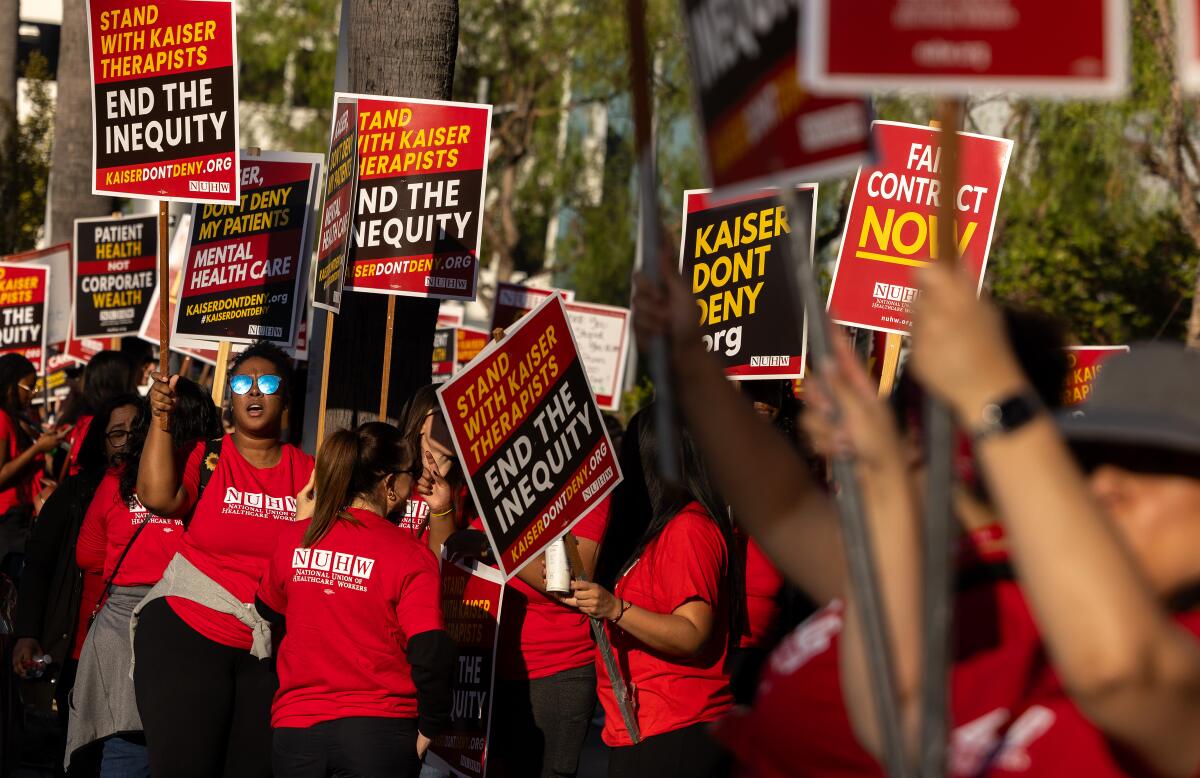Kaiser mental health professionals in Southern California go on strike

- Nearly 2,400 Kaiser mental health workers launch a strike after management rejected proposals that union workers said would stanch employee turnover and improve care.
- Kaiser said it had made strong proposals to improve wages, benefits and preparation time for therapists.
- The strike comes one year after Kaiser agreed to a $200-million settlement with California regulators over its handling of mental health care.
Psychologists, therapists and other mental health professionals who work for Kaiser Permanente across Southern California went on strike Monday morning, protesting that the healthcare organization had failed to address enduring problems that hamper its mental health care.
The National Union of Healthcare Workers said that nearly 2,400 mental health workers had launched their job action after Kaiser management had turned down proposals that the union said would stanch employee turnover and improve care. The NUHW contract for the workers expired Sept. 30.
Union members clad in red T-shirts picketed along Sunset Boulevard outside Kaiser’s Los Angeles Medical Center on Monday morning, clanging cowbells and cheering to Twisted Sister’s “We’re Not Gonna Take It.”
“Unless we strike, our co-workers are going to keep leaving,” San Diego psychologist Josh Garcia said in a union statement before the walkout, “and our patients are going to keep struggling in an underfunded, understaffed system that doesn’t meet their needs.”
Ahead of the strike, Kaiser said it had made strong proposals to improve wages, benefits and preparation time for therapists. It faulted the union for “slow walking” negotiations and called its proposals unreasonable, saying that any strike was “because NUHW leadership chose this path — rather than a path to an agreement.”
The strike comes one year after Kaiser agreed to a $200-million settlement with California regulators who found that patients were subjected to excessive wait times for therapy appointments. Kaiser agreed to pay a $50-million penalty and spend $150 million over five years to improve its mental health care.
Kaiser said that even before the state settlement, it had started ramping up mental health care spending. The organization said it had spent more than $1 billion to expand its mental health care in recent years and increased its Southern California mental health workforce by more than 30%.

As the healthcare organization was seeing “throughout California, throughout the nation, this mental health crisis, we knew that we needed to act quickly,” said Rhonda Chabran, its vice president of behavioral health and wellness for Southern California and Hawaii.
Union leaders said problems have persisted. In a recent letter to the state, NUHW alleged Kaiser was continuing to violate California law, which sets timelines for providing mental health care, and that “these failures are widespread.” NUHW said in its surveys of the Kaiser mental health workers in Southern California, 62% of respondents said their departments lacked enough staff to provide timely and appropriate care.
Claudia Melo, a child and adolescent case manager in Pasadena who was picketing outside the Los Angeles Medical Center, said her young clients need to be seen in person weekly, but “we have no capacity.”
“On Friday I was in tears,” Melo said. “It makes you question what you’re doing. ... You have to get your own treatment because you feel defeated at times.”
Courtney Isaac, a Bakersfield licensed marriage and family therapist who came to the Sunset Boulevard picket, said Kaiser seemed focused on “what can we do to get the numbers up, and what they’re forgetting is that we have patients that are severely mentally ill.”
The pressure is to “book more patients. Book every second of every day,” chimed in licensed clinical social worker Leslie Laxson, another Kaiser employee from Bakersfield.
Chabran said in a video statement Monday that Kaiser had made offers at the bargaining table that were aimed at ensuring Kaiser remained a great place to work and that were also “aligned with our responsibility to provide high quality and affordable care for our members.”
The union said it was pushing for higher wages, better benefits and more guaranteed time to handle duties outside of patient appointments. NUHW members lamented that unlike in Northern California, where the union said that Kaiser therapists are now guaranteed seven hours a week to handle tasks such as preparing treatment plans, Southern California therapists with Kaiser may only get two hours a week to do so.
“There’s a lot of things that we need to do in preparing for a visit: Developing appropriate treatment plans. Writing letters for our clients. ... They do not give us the time to do that,” said Lisa Delgadillo, a Kaiser psychiatric social worker in Fontana. “People think therapy is just talking to people, but it’s more than that.”
Kassaundra Gutierrez-Thompson, a psychiatric counselor, said she sees a dozen or more patients a day in a Kaiser virtual therapy program meant for “mild to moderate” patients. Scheduling and other tasks leave under half an hour for each patient, she said.
Gutierrez-Thompson likened it to being a factory worker. “It’s really hard to stay a good therapist in this system,” she said. “We have to make choices like, ‘Do I make eye contact, or do I finish this note?’”
NUHW has also proposed a series of raises totaling more than 30% over four years. Union leaders said the wage hikes were needed to bring their compensation in line with other health professionals at Kaiser.
Kaiser said that its Southern California therapists already have generous benefits and compensation, with wages that are above market rates, and that it had offered raises at the bargaining table totaling more than 18%. It also said it had offered more time for duties outside of face-to-face appointments, but that the union proposal could pull therapists away from seeing patients for a significant chunk of their workweek.
NUHW “isn’t calling for more time to care for patients. It is demanding more money for therapists to spend LESS time seeing patients,” Kaiser said in a statement released Monday morning.
The healthcare system said it had plans in place to minimize possible disruptions from the walkout, which has no defined length. Because Kaiser relies not only on employees but “an external network of contracted providers” for mental healthcare, it estimated that 60% of its patients receiving mental health and addiction services are currently getting care from providers who will not be participating in the NUHW strike.
If their regular provider is on strike, Kaiser said, “patients will have the opportunity to be seen by another professional in our extensive network of highly qualified, licensed therapists.”
Union leaders urged the state to keep tabs on how Kaiser was providing care during the strike, pointing out that the state Department of Managed Health Care found it had canceled appointments for tens of thousands of patients during a walkout by Northern California therapists two years ago.
Workers on the picket line Monday bristled at Kaiser saying the union was “putting pickets before patients.”
“I’m going without pay,” said Linda Cortes, a psychiatric social worker in Pasadena. “But I think this is important — to show Kaiser that we’re really willing to put our money where our mouth is. And they’re not.”
More to Read
Sign up for Essential California
The most important California stories and recommendations in your inbox every morning.
You may occasionally receive promotional content from the Los Angeles Times.










